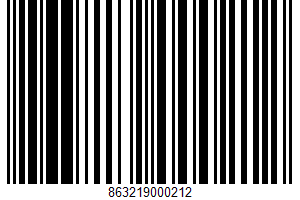Fine Cajun Cuisine Jambalaya - 210 calories
Manufacturer The Cajun Spoon
Product Information and Ingredients
Fine Cajun Cuisine Jambalaya is manufactured by The Cajun Spoon with a suggested serving size of 0.25 cup (57 g) and 210 calories per serving. The nutritional value of a suggested serving of fine cajun cuisine jambalaya includes 0 mg of cholesterol, 0 mg of sodium, 44 grams of carbohydrates, 2 grams of dietary fiber, 2 grams of sugar and 5 grams of proteins.
The product's manufacturer code is UPC: 863219000212.
Fine Cajun Cuisine Jambalaya is a low fat food because it contains less than 3 grams of fat per suggested serving.
Ingredient List
- Enriched Rice (rice
- Niacin
- Iron
- Thiamine Mononitrate Folic Acid)
- Chicken Base (dextrose
- Salt
- Chicken Fat
- Hydrolyzed Soy Protein
- Onion Powder
- Whey
- Chicken Powder
- Silicon Dioxide (anticaking Agent)
- Natural Flavor
- Turmeric)
- Dried Onion
- Dried Red And Green Bell Peppers
- Dried Celery
- Dried Garlic
- Dried Green Onion
- Spices
- Caramel Color
- Dried Parsley

Nutrition Facts
Serving Size 0.25 cup (57 g)
| Amount Per Serving | ||
|---|---|---|
| Calories 210 | Calories from Fat 9 | |
| % Daily Value* | ||
| Total Fat 1g | 1% | |
| Saturated Fat 0g | 0% | |
| Trans Fat 0g | ||
| Cholesterol 0mg | 0% | |
| Sodium 0mg | 0% | |
| Total Carbohydrate 44g | 8% | |
| Dietary Fiber 2g | 5% | |
| Sugars 2g | ||
| Protein 5g | ||
| Vitamin A 3% | Vitamin C 5% |
| Calcium 3% | Iron 9% |
* Percent Daily Values are based on a 2,000 calorie diet.
Nutrition Facts
Serving Size 100g (about 3.52 oz)
| Amount Per Serving | ||
|---|---|---|
| Calories 368 | Calories from Fat 16 | |
| % Daily Value* | ||
| Total Fat 1.8g | 2% | |
| Saturated Fat 0g | 0% | |
| Trans Fat 0g | ||
| Cholesterol 0mg | 0% | |
| Sodium 632mg | 15% | |
| Total Carbohydrate 77.2g | 15% | |
| Dietary Fiber 3.5g | 8% | |
| Sugars 4g | ||
| Protein 9g | ||
| Vitamin A 6% | Vitamin C 8% |
| Calcium 5% | Iron 15% |
* Percent Daily Values are based on a 2,000 calorie diet.
Fine Cajun Cuisine Jambalaya Nutritional Value
| Nutrient | Suggested Serving 0.25 cup (57 g) | Standard Serving 100g |
|---|---|---|
| Energy | 210 kcal (6%) | 368 kcal (10%) |
| Protein | 5 g (6%) | 8.77 g (10%) |
| Total Lipid (fat) | 1 g (1%) | 1.75 g (2%) |
| Carbohydrate, By Difference | 44 g (8%) | 77.19 g (15%) |
| Fiber, Total Dietary | 2 g (5%) | 3.5 g (8%) |
| Sugars, Total | 2 g (5%) | 3.51 g (8%) |
| Calcium, Ca | 60 mg (3%) | 105 mg (5%) |
| Iron, Fe | 2.7 mg (9%) | 4.74 mg (15%) |
| Sodium, Na | 360 mg (9%) | 632 mg (15%) |
| Vitamin C, Total Ascorbic Acid | 4.8 mg (5%) | 8.4 mg (8%) |
| Vitamin A, Iu | 300 IU (3%) | 526 IU (6%) |
| Fatty Acids, Total Saturated | 0 g (0%) | 0 g (0%) |
| Fatty Acids, Total Trans | 0 g (0%) | 0 g (0%) |
| Cholesterol | 0 mg (0%) | 0 mg (0%) |
Calories Burn off Time
How long would it take to burn off The Cajun Spoon Fine Cajun Cuisine Jambalaya with 210 calories? A brisk walk for 46 minutes, jogging for 21 minutes, or hiking for 35 minutes will help your burn off the calories in fine cajun cuisine jambalaya.
Burn off time varies based on your weight, physical activity and exercise intensity. The following physical activity table contains an estimated burn off time for a person weighting 154 lbs.
| Physical Activity | Burn Off Time |
|---|---|
| Bicycling - 10 mph or less | 44 minutes |
| Dancing | 38 minutes |
| Golfing | 38 minutes |
| Hiking | 35 minutes |
| Light Gardening | 38 minutes |
| Stretching | 70 minutes |
| Walking - 3.5 mph | 46 minutes |
| Weight Training - light workout | 58 minutes |
| Aerobics | 26 minutes |
| Basketball | 29 minutes |
| Bicycling - 10 mph or more | 21 minutes |
| Running - 5 mph | 21 minutes |
| Swimming | 25 minutes |
| Walking - 4.5 mph | 28 minutes |
| Weight Training - vigorous workout | 29 minutes |
Footnotes
Percent daily values are based on a 2,000 calorie reference diet. Factors like age, gender and level of physical activity may affect your daily required values.
The editorial opinions regarding food value or quality in this website are given without warranty, and are not intended to replace medical advice or a nutritionist guidance.
Dietary Recommendations
A healthy eating pattern that accounts for all foods and beverages within an appropriate calorie level could help achieve and maintain a healthy weight and reduce the risk of chronic disease. Healthy eating habits include the following:
- Vegetables from all subgroups, including dark, green, red and orange vegetables and also beans and peas
- A variety of whole fruits
- Grains with at least half of which are whole grains
- Low or fat free dairy products, including milk, yogurt, cheese and/or fortified soy beverages
- Protein foods, including seafood, lean meats and poultry, eggs and nuts
- Oils with limited amounts of saturated fats and trans fats, added sugars, and sodium
